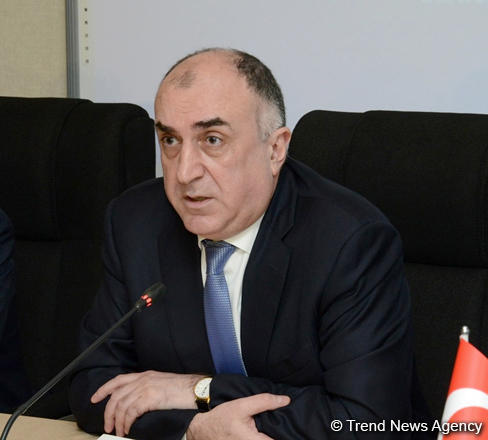Political turbulence in Armenia hinders talks on Karabakh conflict: Azerbaijani FM

By Trend
Ongoing political turbulence in Armenia is hindering progress in the negotiation process on the settlement of the Armenia-Azerbaijan Nagorno-Karabakh conflict, Azerbaijani Foreign Minister Elmar Mammadyarov said Nov. 2 in an interview with Bulgaria’s Focus News Agency.
Mammadyarov noted that the settlement of the Armenia-Azerbaijan Nagorno-Karabakh conflict is one of the important issues for the sustainable development and prosperity of the region.
“Azerbaijan, which from the first days of its independence faced occupation policy of Armenia, with one fifth of its territory occupied by the Armenian armed forces, and which has more than one million refugees and internally displaced persons, is well aware of the price of peace, security and stability,” he said. “Namely for this reason our country has been participating in negotiations that last for more than 20 years."
"Azerbaijan has always declared that it is ready for substantive and result-oriented negotiations. The conversation of Azerbaijani President Ilham Aliyev and Prime Minister of Armenia Nikol Pashinyan during the recent summit of CIS countries is a clear indicator of our country’s readiness to substantive negotiations on the settlement of the conflict.”
The Azerbaijani minister also noted that the position of the international community, including the four resolutions adopted by the UN Security Council, as well as resolutions of other international organizations related to the settlement of the conflict are unequivocal: Armenia must withdraw its troops from the occupied territories of Azerbaijan, and the people expelled from these territories must return to their homes.
“Only after that it will be possible to establish peace in the region, to ensure stability and progress,” he added. “But, unfortunately, the current situation in Armenia and the ongoing political turbulence there are hindering progress in the negotiation process.”
Mammadyarov said that in a short time Armenia should demonstrate political will in preparing for substantive dialogue within the existing format and, finally, should understand that the formula of peace that will lead to security in the region, as well as to the economic development of Armenia itself, is in the withdrawal from occupied Azerbaijani territories and the return of local Azerbaijanis to these territories.
The conflict between the two South Caucasus countries began in 1988 when Armenia made territorial claims against Azerbaijan. As a result of the ensuing war, in 1992 Armenian armed forces occupied 20 percent of Azerbaijan, including the Nagorno-Karabakh region and seven surrounding districts.
The 1994 ceasefire agreement was followed by peace negotiations. Armenia has not yet implemented four UN Security Council resolutions on withdrawal of its armed forces from the Nagorno-Karabakh and the surrounding districts.
---
Follow us on Twitter @AzerNewsAz
Here we are to serve you with news right now. It does not cost much, but worth your attention.
Choose to support open, independent, quality journalism and subscribe on a monthly basis.
By subscribing to our online newspaper, you can have full digital access to all news, analysis, and much more.
You can also follow AzerNEWS on Twitter @AzerNewsAz or Facebook @AzerNewsNewspaper
Thank you!
